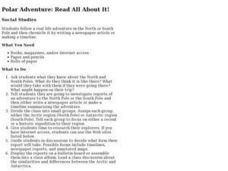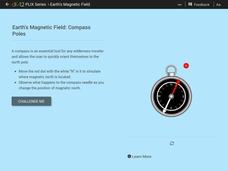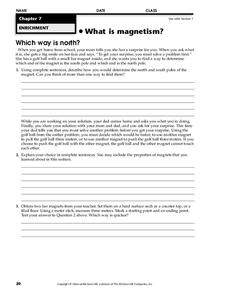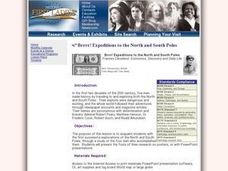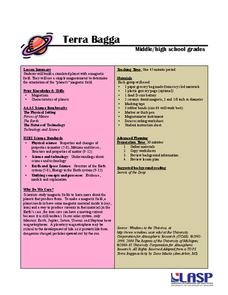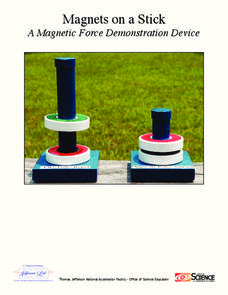Curated OER
Earth's Poles
In this Earth's Poles activity, students survey, examine and dissect the North and South Magnetic Poles, the Earth's axis and summarize the Aurora legends. Students research six directives involving space weather and predicting answers.
Curated OER
World Map and Globe-Equator, North Pole, and South Pole
Students identify the Equator, North Pole, and South Pole on a map. For this geography lesson, students use a world map and circle the North and South Pole. Students locate the Equator on a globe and use a map marker to highlight it.
Curated OER
North And South Pole Venn Diagram
In this compare and contrast worksheet students use a Venn diagram. Students compare and contrast the North Pole and the South Pole. No information is provided.
Curated OER
Polar Adventure: Read All About It!
Students investigate reports of an adventure to the North Pole or the South Pole and then chronicle it by writing a newspaper article or making a timeline. The focus is placed on a recent or historic expedition to the region selected.
CK-12 Foundation
Earth's Magnetic Field: Compass Poles
You'll be strangely drawn to this activity! Physical science pupils learn how compasses work in an interesting interactive. The content covers magnetic poles, Earth's magnetic field, and what would happen if Earth's poles swapped places.
Curated OER
Which Way is North?
In this magnets worksheet, students explain how they would determine the north and south poles of a magnet. This worksheet has 3 short essay questions.
National First Ladies' Library
Brrrr! Expeditions to the North and South Poles
Learners examine the first successful explorations of the North and South Poles, through a study of the four men who accomplished them. They present the fruits of their research on posters, or with PowerPoint presentations.
Curated OER
The Magnetometer
Students build an instrument. In this magnetism lesson, students learn about the north and south poles of magnets and build a magnetometer that detects the direction of a magnetic field.
Curated OER
True North, Magnetic North
Students explain why compass angles need to be corrected for regional magnetic variation. They observe the difference between magnetic and true north. Each student measures the angle of variation for a town in a different state.
Curated OER
The North and South Magnetic Poles
In this north and south magnetic poles instructional activity, students read about the presence of auroras over the earth's magnetic poles as opposed to the geographic poles. Students use 2 photographs taken by the IMAGE FUV and the...
Curated OER
Electricity/Magnetism
Fourth graders explore magnets as fundamental parts of generators and how they are used to produce current electricity. They distinguish between the north and south pole of magnets and the difference between repel and attract. Students...
Curated OER
Earth's Features
In this geography worksheet, learners label a map of the world with the Arctic Circle, Tropic of Capricorn, Tropic of Cancer, Equator, North Pole, South Pole, and the Antarctic Circle.
Curated OER
Terrabagga Activity Using a Magnetometer
Clever! Earth science learners construct a model of a planet containing a magnetic core. The planet, Terrabagga, is made out of a paper grocery bag, magnets, a dead D battery, and rubber bands. Pictures of each step of the construction...
University of Colorado
Terra Bagga
One way to identify possible volcanic activity on other planets is by testing the planet for magnetism. A science lesson begins with pupils constructing their own planet from a dead battery, magnets, paper, and tape before labeling the...
Curated OER
Magnetic Earth
In this magnetic Earth worksheet, students learn how a compass works with the magnetic poles of the Earth. This worksheet has 4 short answer questions.
Curated OER
The Magnetometer
Physical or earth science pupils prepare a magnetometer by inducing magnetism into a pair of straight pins. As the pins hang from a thread, they can be used to detect the magnetic field or poles of a magnet. They could also be used as a...
Curated OER
Equator, North Pole, and South Pole
Students identify the Equator, North Pole, and South Pole on the globe. For this map skills lesson, students use a globe marker to locate specific locations on the globe. Students find where they live in relation to the Equator.
US Department of Energy
Magnets on a Stick: A Magnetic Force Demonstration Device
Why do some magnets attract while others repel? Scholars use clearly labeled permanent magnets to explore the attractive question. They compare the behavior of like versus opposite poles to find the answer.
CK-12 Foundation
Coriolis Effect: Flying... South?
It turns out there's a lot more to heading south for the winter for migratory birds! Study the Coriolis Effect with a fun, hands-on teaching tool. Pupils take to the skies as a small red bird bound for the tropics from his frosty home at...
Curated OER
Adopt a City-Winter Weather
In weather worksheet, students use an on line site to collect weather data. They create 10 different weather scenarios using a temperature and humidity slider. They includethe temperature, relative humidity and weather conditions and...
Curated OER
World Map and Globe - Four Main Directions
Students study the four main directions on a map. In this map lesson, students locate the North and South pole, and learn the four cardinal directions. They use the compass rose on a map to help with the directions. (Map is not included...
Curated OER
United States Map - Lesson 7: Four Main Directions
Students locate the North and South Poles, and learn the definitions of the four directions by using a United States Map and a globe. In this directions lesson plan, students define north, south, east, and west on a map and a globe.
Curated OER
Four Main Directions
Students describe directions using a globe for north, east, south and west. In this mapping lesson students identify the north and south pole. Students understand the importance of the equator and the Prime Meridian. Students explain how...
Curated OER
Do Some Research: Earth
In this universe research worksheet, students read the sentence and use a library or the Internet to find the answer and write it on the blue line. Students must then write a report about this topic: the ____ regions are the area around...





